Food for thought for investors in UAE-India summit
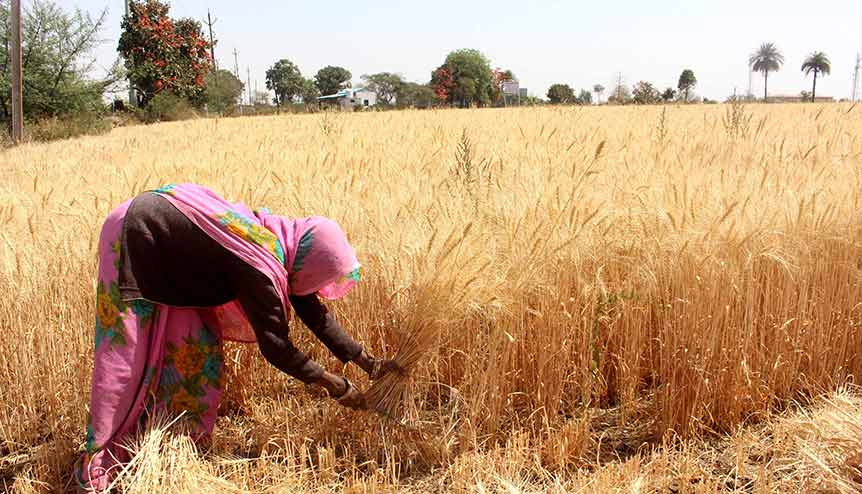
India showcases the massive potential for its food and agritech sectors at Dubai conference on the back of biggest and boldest reforms to its farming economy.
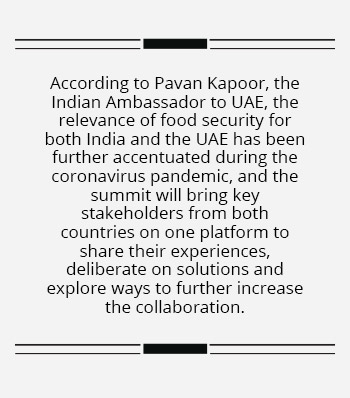 With food security emerging as a key pillar of the forward-looking vision of the United Arab Emirates and India increasingly focusing on agritech and other tools to dramatically curb a colossal wastage of agri products on the back of the biggest reforms to its massive farm economy, it’s natural that the two countries have found common ground to build a solid partnership in these sectors.
With food security emerging as a key pillar of the forward-looking vision of the United Arab Emirates and India increasingly focusing on agritech and other tools to dramatically curb a colossal wastage of agri products on the back of the biggest reforms to its massive farm economy, it’s natural that the two countries have found common ground to build a solid partnership in these sectors.
Read more:
India-UAE ties boosted through healthcare partnerships
India-UAE eye energy cooperation boost
India seizes new strategic opportunities in the GCC
India-UAE recognise there is wealth in health
India and Israel ‘renew’ their vow to achieve a low carbon future
In November 2018, the National Strategy for Food Security was presented during the UAE Government’s second Annual Meetings, with its goals focusing on “facilitating the global food trade, diversifying food import sources identifying alternative supply schemes, and covering three to five sources for each major food category.”
Great potential for further cooperation between India & UAE https://t.co/rgec2yENX0
— Amb Pavan Kapoor (@AmbKapoor) December 7, 2020
In line with its National Food Security Strategy 2051, the UAE has been investing robustly in developing food security, and its potential investment into India in the sector includes agricultural produce as well as logistics for storage and transport.
Against the backdrop of the coronavirus pandemic and the resultant disruption of global food and agricultural product supply networks, those strategies have taken on an even more immediate and urgent meaning – and a high-profile India-UAE summit in Dubai that begins today aims to explore ways of further boosting bilateral collaboration in the food security sector.
Highlights of the Gala curtain raiser & dinner of the UAE-India #FoodSecuritySummit2020 held at @TajHotelDubai with the participation of delegates from both UAE and India. @FollowCII @investindia @IndembAbuDhabi @UIBCIndia pic.twitter.com/BhUxJyUf8Y
— India in Dubai (@cgidubai) December 8, 2020
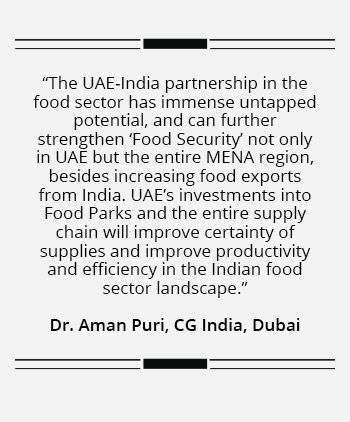 Spotlight on UAE-India Food Security Summit
Spotlight on UAE-India Food Security Summit
The UAE-India Food Security Summit is being organised in Dubai by the Consulate General of India in Dubai, in association with the Confederation of Indian Industries (CII) and Invest India.
The two-day summit will see discussions and presentations on food processing, equipment and technology, development of logistics and integrated cold chains, investments into food parks, agro-processing clusters, infrastructure development for fishing harbours and showcase milestones by Indian companies in the field of aquaculture, hydroponics, saline irrigation and vertical farming.
More to read:
India shining in the Middle East
Digitalisation has brought a fresh breath to India’s agricultural culture
Indian diamond traders set to unlock sparkling potential of Israel-UAE ties
India is entering the retail LNG space
Indian start-ups make a beeline for the UAE
“The UAE-India partnership in the food sector has immense untapped potential, and can further strengthen ‘Food Security’ not only in UAE but the entire MENA region, besides increasing food exports from India. UAE’s investments into Food Parks and the entire supply chain will improve certainty of supplies and improve productivity and efficiency in the Indian food sector landscape. With this summit, we hope to take this partnership to the next level,” said Dr Aman Puri, Consul General of India in Dubai.
“In the post-COVID world, we should not be thinking of getting back to business as usual. This is the time to reflect, reset and refresh our approach to doing business. We need to collaborate more, leverage technology and maximise productivity and efficiency,” he said.
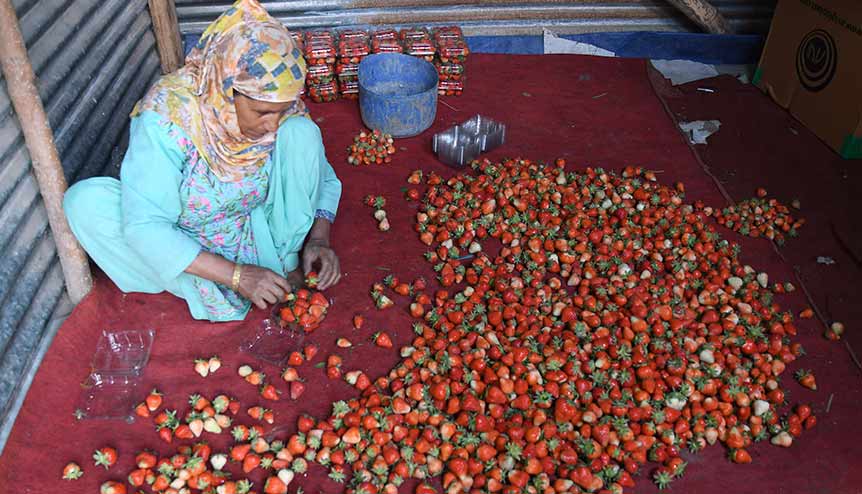
A Kashmiri farmer packs strawberries on the outskirts of Srinagar. The Food Security Summit is witnessing the participation of a 20-member delegation of businessmen and government officials from Jammu and Kashmir. Plans are being put in place for them to contribute to the Gulf Food basket.
A bite of Kashmiri apples
While the event will bring together a wide range of experts and officials from both countries – including Pavan Kapoor, Ambassador of India to UAE, Dr Ahmed Al Banna, Ambassador of UAE to India, Mekapati Goutham Reddy, Industries and Commerce minister of Andhra Pradesh, Maj Gen (Retd) Sharafuddin Sharaf, UAE-India Business Council Chairman and Sharaf Group Vice Chairman, and Invest India CEO Deepak Bagla, the conference is also breaking new ground with the participation of a 20-member delegation of businessmen and government officials from Jammu and Kashmir.
Watch#KNS*
UAE-India Food Security Summit,Dubai
From J&K Director Horticulture Kashmir KAS Ajaz Ahmed Bhat shares comment, pic.twitter.com/3UajmwrJLM— 𝑲𝒂𝒔𝒉𝒎𝒊𝒓 𝗡𝗲𝘄𝘀 𝗦𝗲𝗿𝘃𝗶𝗰𝗲 (@KNSKashmir) December 7, 2020
Majid Aslam Wafai, the president of the Jammu & Kashmir Apple Cold Store Association (JKPICCA), told PTI that the delegation was in Dubai to explore and understand Gulf markets as the Indian government was keen to see the Kashmiri apple in the Gulf food basket. “We had a very fruitful meeting with the Dubai Chamber of Commerce, which was headed on our side by Principal Secretary Navin K Chaudhary. We have received positive feedback during this meeting and we hope to leverage this to ensure supply to this part of the world,” Wafai said.
Opportunity for UAE investors
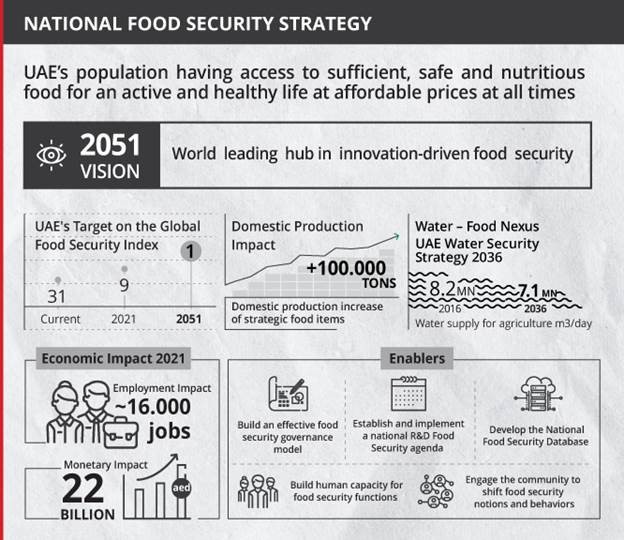 According to Pavan Kapoor, the Indian Ambassador to UAE, the relevance of food security for both India and the UAE has been further accentuated during the coronavirus pandemic, and the summit will bring key stakeholders from both countries on one platform to share their experiences, deliberate on solutions and explore ways to further increase the collaboration. With more than 200 prominent businessmen and representatives of public sector organisations, business enterprises, investors and institutions from both UAE and India taking part in the summit, the event is not only a reflection of the close synergy between India and the UAE in strategic sectors, but is also a lucrative opportunity for investors to unlock the immense potential of the sectors under focus.
According to Pavan Kapoor, the Indian Ambassador to UAE, the relevance of food security for both India and the UAE has been further accentuated during the coronavirus pandemic, and the summit will bring key stakeholders from both countries on one platform to share their experiences, deliberate on solutions and explore ways to further increase the collaboration. With more than 200 prominent businessmen and representatives of public sector organisations, business enterprises, investors and institutions from both UAE and India taking part in the summit, the event is not only a reflection of the close synergy between India and the UAE in strategic sectors, but is also a lucrative opportunity for investors to unlock the immense potential of the sectors under focus.
India is Looking West: Relations between New Delhi & the Gulf nations have undergone a fundamental reset, writes
Minister @DPradhanBJP ji
PM @NarendraModi ji & the Gulf leadership are recreating a civilisational connect that had rusted over the years.https://t.co/hf2FZMilDT pic.twitter.com/1qe9QGbSmS
— Piyush Goyal (@PiyushGoyal) December 7, 2020
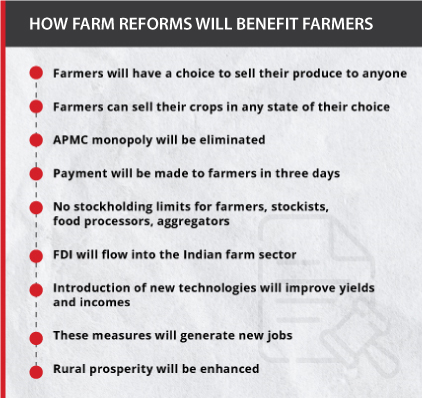 $7 billion food corridor planned
$7 billion food corridor planned
The UAE real estate giant Emaar, for instance, has been on the forefront of developing a $7 billion food corridor between the UAE and India, coordinating with the Indian government for the potential investment in which several other UAE entities will also play a key role.
Still more to read:
India and UAE build the foundations for food security
India-GCC dialogue paves way for robust growth
Modi’s strategic tango with Arab states paying rich dividends
Atmanirbhar Bharat means an India that works for global good
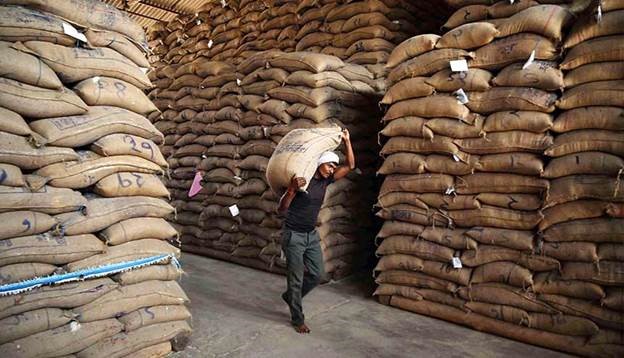
With the combination of reforms, deployment of technology and the close collaboration between India and the UAE, their food and agritech sectors are thus ready to take off for a bold and secure era of growth and prosperity.
According to Piyush Goyal, the Indian Minister of Commerce and Industry, Emaar Group is coordinating with other entities to invest up to $5 billion in mega food parks and similar facilities in various Indian cities, as well as $2 billion in contract farming, sourcing of agro commodities and related infrastructure. The proposed mega food park projects are in locations such as Kutch in Gujarat, and Aurangabad in Maharashtra. Projects also include another food park in Pawarkheda (Madhya Pradesh), a fruits and vegetables hub in Nashik (Maharashtra), a logistics and warehouse hub in Itarsi (Madhya Pradesh), and another warehousing hub in Bhiwandi (Maharashtra). The possibility of eight other food parks is also under consideration, he said.
With foreign investors zeroing in on the agritech sector in India, startups and venture capital are pouring into what would have seemed an unlikely sector to invest a few years back. Indian Prime Minister Narendra Modi’s government enacted bold new reforms in farming laws in September that will “remove middlemen and let farmers sell their produce directly to buyers,” improving their prospects, especially in far flung areas.
New farming laws a game-changer
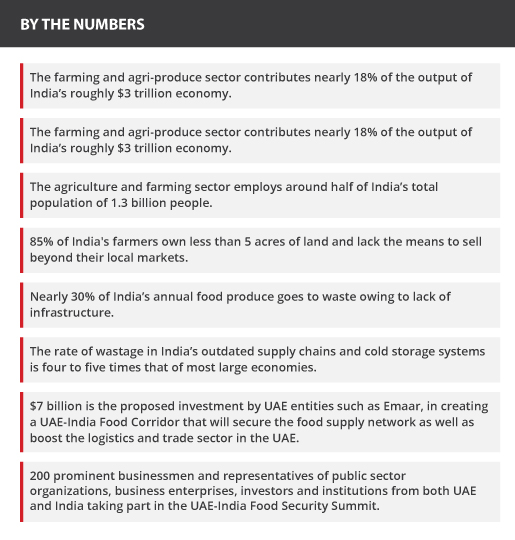 Potentially the biggest reform ever to India’s massive farm economy, the resultant deregulation is a watershed moment for Indian agriculture and agritech, as entrepreneurs rush to sell farmers apps and other modes of technology to help connect them to major buyers nationwide and use artificial intelligence (AI) to strengthen the supply chains that lose one-fourth of India’s food produce to wastage. As a result, producers and buyers in India are both looking for business, backed by investors with access to high-tech solutions.
Potentially the biggest reform ever to India’s massive farm economy, the resultant deregulation is a watershed moment for Indian agriculture and agritech, as entrepreneurs rush to sell farmers apps and other modes of technology to help connect them to major buyers nationwide and use artificial intelligence (AI) to strengthen the supply chains that lose one-fourth of India’s food produce to wastage. As a result, producers and buyers in India are both looking for business, backed by investors with access to high-tech solutions.
Some 85% of India’s farmers own less than 5 acres of land and lack the means to sell beyond local markets, even if that means forgoing better prices.
But Rakesh Singh, a potato farmer in Uttar Pradesh, hopes to break ranks with his lot soon – thanks to computer-enhanced tools to help his business in India’s most populous state. “Real-time prices available on live electronic trading platforms and easy-to-use trading apps for mobile phones make the process of price discovery and selling goods a transparent and hassle-free experience for us,” Singh told Reuters.
With the combination of reforms, deployment of technology and the close collaboration between India and the UAE, their food and agritech sectors are thus ready to take off for a bold and secure era of growth and prosperity.




